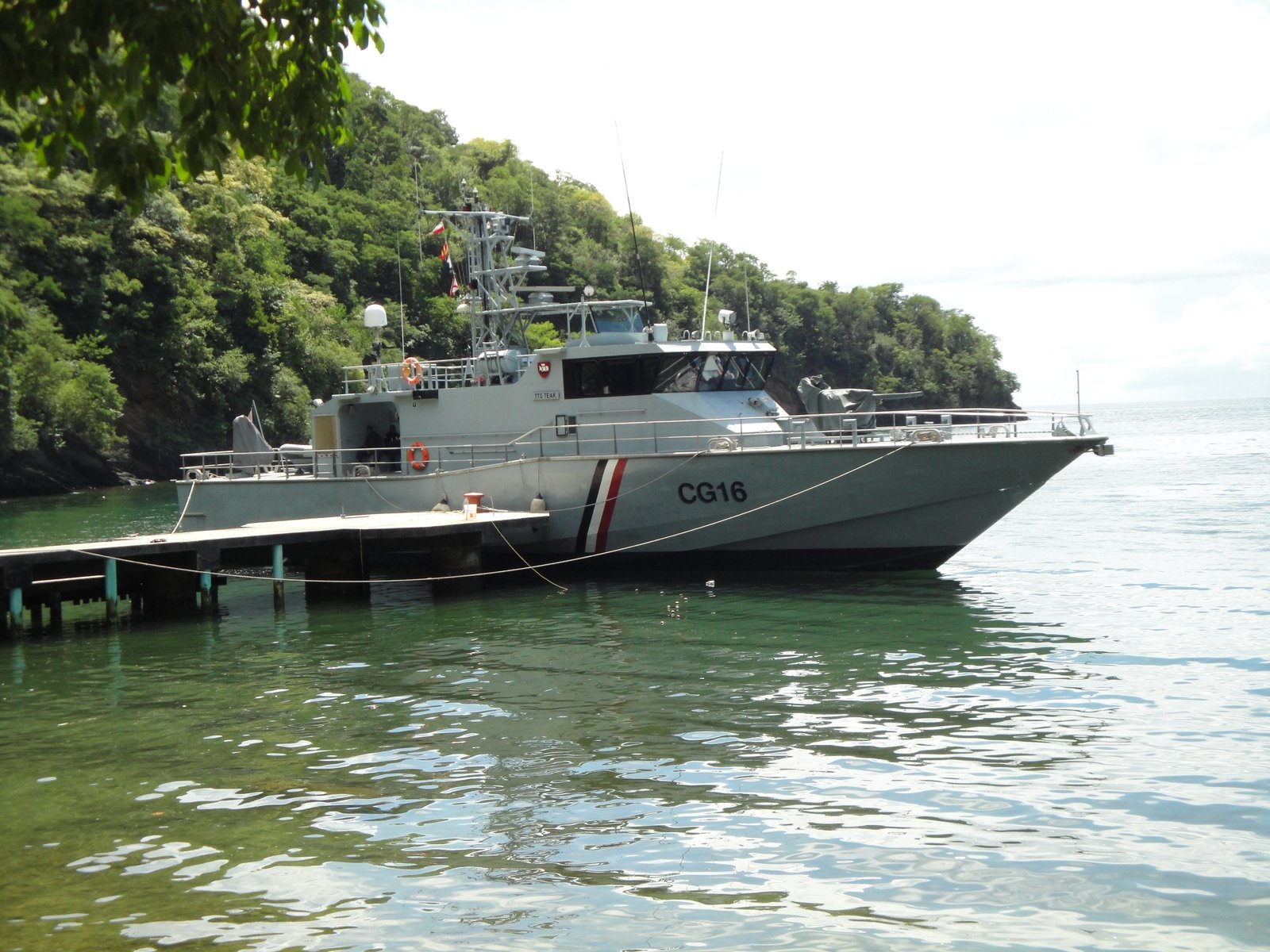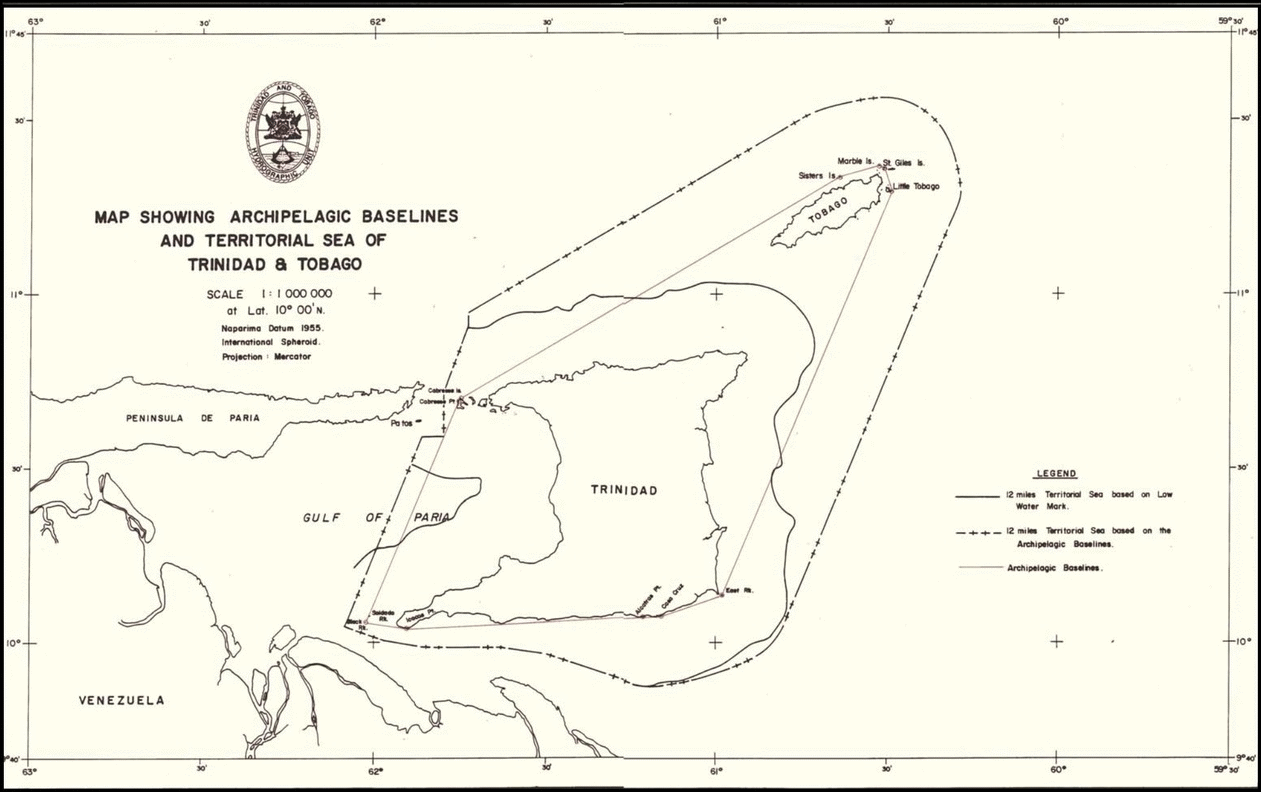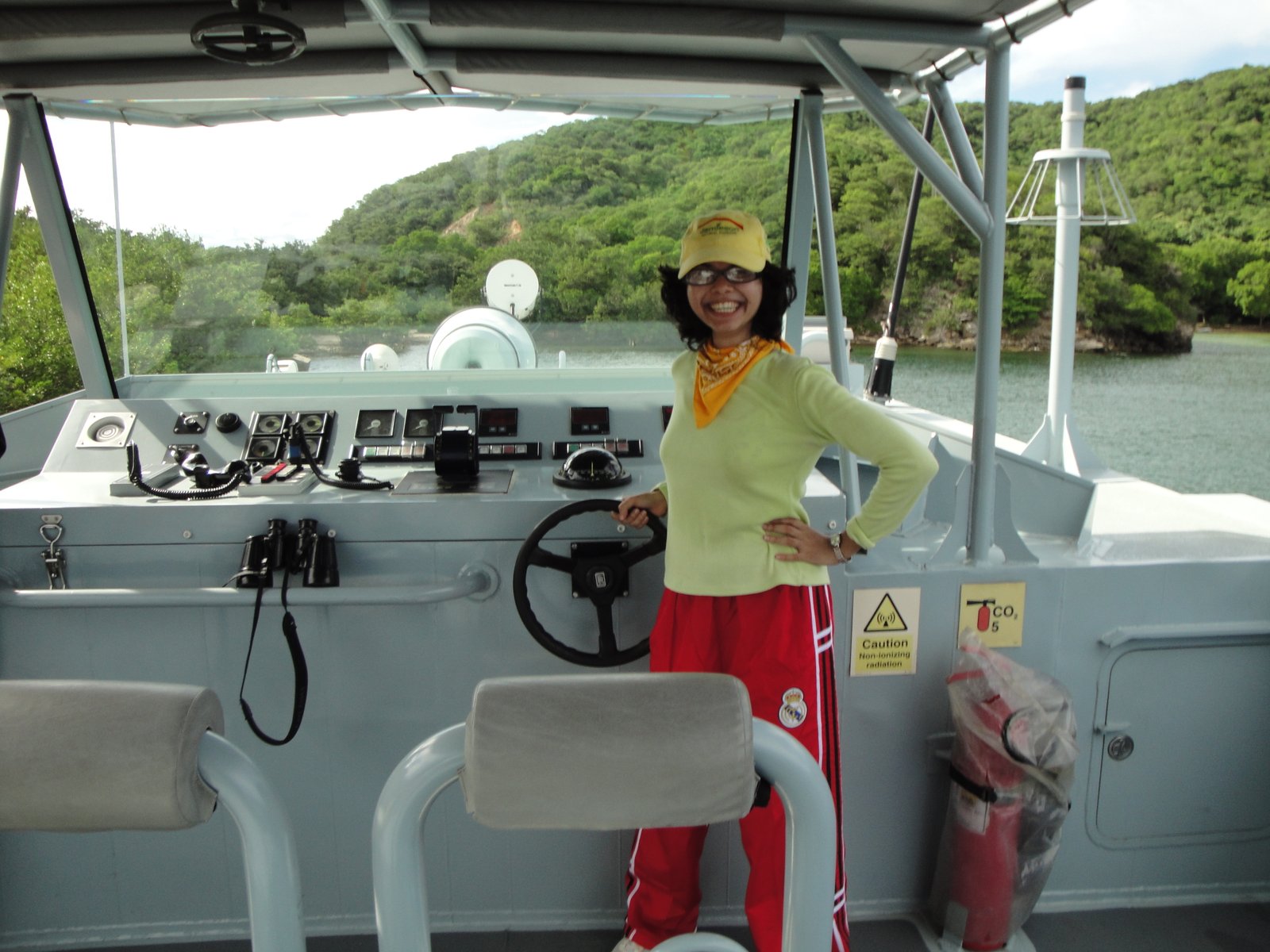It’s a Matter of National Security!

It was during October 2011… the last time Trinidad and Tobago declared a State of Emergency (SoE), and my first time experiencing one. I was in my second year of undergrad at UWI. For one of my courses, Caribbean Island Ecology and Biogeography, a field trip was scheduled every year to visit “Down the Islands” for one weekend. This included camping over-night on Chacachacare Island. The university would usually hire pirogues to transport students. However, that year, with the imposed curfew, we were only permitted a day visit to both Monos and Chacachacare Islands. It was on that day, a Sunday, I had my first encounter with the Trinidad and Tobago Coast Guard.
I remember disembarking from the maxi-taxi when we arrived at HQ in Staubles Bay, Chaguaramas. It was like a scene from The Shawshank Redemption: all of us in an orderly manner, marching one behind the other in a straight line towards the building, carrying all the supplies we needed for our day trip. Our lecturer, Professor Starr, The Most Interesting Man in Trinidad & Tobago, entrusted one of my classmates, with the “manly” task of carrying our “bush weapons” such as knives and cutlasses. These were wrapped up in newspapers with the handles showing. Before we had stepped out of the maxi, that same classmate and I joked that if anyone at HQ perceived him as a threat and came to tackle him, he would simply pass the cutlasses to me, since no one would tackle a girl. We both agreed to this silly plan. Anyway, while I walked behind him, I noticed he kept his head bent low, as if trying to conceal his face with his cap as he carried those “weapons” past the many armed sailors on the compound. He was shaking uncontrollably, presumably scared by the sight of men carrying big guns. At one point he looked like he wanted to pass out, or even throw the “weapons” to me then try to make a run for it. Didn’t happen though, but it was funny to watch. At the time he didn’t realise it, but permission was already granted to bring these along on the trip.
All the coast guard men were quite pleasant. They assisted us in boarding the vessel, TTS TEAK.

Up close and personal, this vessel looked huge. I chose to stay on the top deck, closest to the captain for the duration of the voyage. During the trip, my demonstrator encouraged me to come across to the railing to experience the thrill of the journey. I was so scared, since the safety rule was to always hold tight onto something for the entire trip. After all, one didn’t want to pitch off the vessel in case it hit a “pothole”, or worse, applied sudden brakes! I couldn’t reach the rail without letting go of the post I held onto, so when my demonstrator reached out his hand to help pull me towards the rail, I grabbed the opportunity, and his hand. The combination of the wind rushing through my hair, while simultaneously making me all squinty eyed and breathless at top speed gave me an adrenaline rush. I felt like I was flying on the ocean highway! It was wild! It was exciting! That was about 7 years ago.
Now, when I think of the Coast Guard, I envision a bunch of men in crisp, clean, white uniforms, standing on their vessels poised like a bunch of Captain Jack Sparrows, guarding our country’s waters against those wishing to plunder our land. But, my curiosity piqued me. There had to be more to this hidden world. So for more insight, I located a Captain Don Juan, whose true identity shall remain anonymous. Through him, I was given a snapshot into this world. So here goes…
BRIEF BACKGROUND
Our Trinidad and Tobago Coast Guard (TTCG) will celebrate its 56th birthday later this year. It was established August 27th, 1962, just a few days shy before we achieved Independence on August 31st, 1962 from the British Empire. It is one of the four organizations that comprises the Trinidad and Tobago Defence Force (TTDF), which are all manned by the Ministry of National Security. From the TTCG’s inception, it comprised of 6 officers & 42 sailors. Today, there are more than 100 officers and 1400 sailors, of which roughly 300 are women.
ROLES
The TTCG plays many roles which include:
- Security (24/7 surveillance and patrols of T&T’s maritime jurisdictions, manage safety of shipping and security of ports)
- Law enforcement (maintain law and order, anti-smuggling / counter-narcotic operations)
- Defence (the naval arm intervenes in the event conflict or war breaks out)
- Emergency response (Search and rescue operations)
- Aids and provides support to other services such as the T&T police service and regiment, immigration division, customs and excise division, prison service, fisheries and environmental protection, and scientific research.
They really are involved in everything, from drug busts, illegal arms and ammunition seizures, detaining persons involved in human trafficking and prostitution, humanitarian efforts such as providing disaster relief for e.g. Dominica, after the passage of hurricane Maria in 2017, assisting the Environmental Management Authority (EMA) in coastal clean-ups, and even transporting oxygen to Tobago’s General Hospital. And of course, if need be, provide an escort service off the mainland to, “down the islands”. That’s what they did for us during the SoE.
PROFESSIONS
There are a myriad of professions in the TTCG, from the trades such as carpentry and electrical, to administration, telecommunication, engineering, logistics, intelligence, divers, rescue swimmers, naval officers, special forces, etc.
MARITIME BOUNDARIES
The sovereign state of T&T consists of 23 islands. These islands are so close to each other, that they constitute an “intrinsic geographical and economic unit.” This thereby makes T&T an archipelagic State, according to the Laws of Trinidad and Tobago, Chapter 51:06, Act No. 24 of 1986, and International Law. The archipelagic baselines, also known as the maritime boundaries of Trinidad and Tobago enclose all 23 islands. These baselines join the parts of the outermost islands of the archipelago in a straight line, starting from East Rock (Point 1) in the south-east, all the way around to Little Tobago (Point 11) in the north-east.

All water inside the archipelagic baselines is called archipelagic waters, or Internal waters. Here, T&T allows the right of “Innocent passage” to ships of foreign countries. Innocent passage means not undertaking activities which can be interpreted as a threat to the State.
12 nautical miles beyond the archipelagic baseline is the Territorial waters. Foreign ships are also allowed “Innocent passage” but this can be temporarily suspended by the president of T&T, if there is a threat to national security.
At a distance of 200 nautical miles from the baseline, extending outwards past the territorial sea is called the Exclusive Economic Zone (EEZ). Within this zone, T&T has the sole right over exploration, exploitation, conservation and management of all the resources therein, e.g. fisheries, oil and natural gas reserves. All foreign countries are again allowed the freedom of navigation and overflight, subject to the reguations set out by T&T.
Within all areas: archipelagic waters, territorial sea and the EEZ, the laws of T&T are enforced.


See link of map here.
CAPTAIN DON JUAN’S EXPERIENCE
Q:What is a typical day like in the TTCG?
It depends on the job level, but for Captain Don Juan, he summed it up nicely into one word- “STRESSFUL”.
“It’s a high stress environment. Very demanding…very difficult. It’s always about getting the job done.”
People don’t realise there’s a lot of strain on one’s personal and family life. It takes a great level of commitment to put one’s job first. After all, the motto is “Service Before Self.” The job is fraught with many sacrifices, some greater than others. There are fathers estranged from their children, simply because they were not able to play a more active role in raising them since they were too busy with the job.
Even at home, “Your time is not your time.” There is no rest as there is the constant barrage of phone calls from one’s superiors. One is never fully off duty. After all, defence never takes a break.
Q:Boot-camp training…What is it?
“Any creative mechanism to physically exhaust you.”
Boot-camp is extreme physical training and conditioning. They will push you until exhaustion. And after they exhaust you, they give you more…more push-ups, more sit-ups, more squats, more running…more…everything. It’s intense like the first half hour of the movie Full Metal Jacket.
Remember that scene from the movie, when Gomer Pyle was hazed by his mates for failing to get anything right? Well, the punishment is real. Captain Don Juan, recounted a funny story of a recruit who couldn’t march right. Instead of marching with opposite arm and leg, he would swing the same arm and leg. They refer to this as “Tick-Tocking,” since the movement resembles that of a clock. For months this man marched improperly. Until one day, the instructors had enough. Remember creative? Well, they made him hold concrete blocks in each hand and ordered him to march without dropping them. Picture the instructor shouting, “Yuh want to tick-tock?! Well here, continue tick-tocking! And if yuh stop, yuh dead!” Believe it or not, the next time everyone marched, this recruit marched perfectly. Never tick-tocked again. Guess they found the most effective training technique to straighten him out!
G.I. Jane is also a good portrayal of what women undergo during training, especially when they have to work twice as hard as the men. After all, they can’t take a day off just on the account of menstrual cramps.
Q:What did they make you do?
Oh, did I mention creative?!! From the recruits toting and doubling those heavy, T&TEC looking poles over each shoulder, to the instructors walking the “nautical mile” across their chests. This is when the recruits lie on their backs on the ground, with those weighted poles resting upon their chests. The instructors would then walk across them.
Captain Don Juan recalled returning home for a weekend, extremely fatigued from training. He knocked out for a straight 16-17 hours on the couch. He awoke in yesterday’s clothes. Imagine feeling that way every-day during training!
Q:Do you remember how you felt after the first day of training?
Captain Don Juan joined the TTCG after finishing school, through the suggestion of a friend. When asked how he felt after the first day of boot-camp, he said,
“What de f*** I doing here?”
He asked himself that question every-day for years.
So…If it was so hard, why did he stay?
The main reason was that he refused to let that time go to waste. The further along he invested himself into the training, the more it inspired him to continue. He was not leaving without gaining something in return.
And gain he did. As he served for over a decade, he took advantage of the many opportunities such as training and education to develop himself holistically. The man he is, is no longer the man he was. He can deal with any situation that life throws at him.
“I know what I am capable of…physically, mentally, emotionally.”
Q:What did you learn from training?
“You go through things you never thought possible. You’re mentally stressed. You want to give up.”
Training can break a man down. It’s okay to cry, but do it where no one can see you. “Leave that crying for your pillow at night.” If the instructors see a man crying, they will give him a reason to cry every-day for the rest of his training. They will give him hell. They will, “bend him out.”
Q:Why?
“Cause it’s a sign of weakness.”
No wonder your batch is everything. These are the people you trained together with. After you’ve been indoctrinated through the rigors of training, you become close. They become your brothers and sisters. You either Love them, or Hate them.
Q:So how did you survive?
“I made up my mind.”
He told himself, “Don’t think, just DO. Push until you can’t push anymore. Don’t give up.”
Q:How has it changed you?
“It dramatically improved every single relationship. Absence truly makes the heart grow fonder. My loved ones are my anchor.”
Q: Any good memories?
He recalled some “good times” he had while patrolling out at sea. Whenever the coast guards stopped suspicious vessels, they would play the beginning of Ruff Ryders’ Anthem by DMX:
“…Stop, drop, shut ’em down, open up shop
Oh, no
That’s how Ruff Ryders roll
Stop, drop, shut ’em down, open up shop
Oh, no
That’s how Ruff Ryders roll”
They would then proceed to board and search the vessels.
Q: Advice for future recruits?
“Have a really, really good reason for joining. That reason will be your motivation. Your anchor.”
“And take the positive out of each experience. There will be some bad ones yes, but look at them as developmental.”
“There’s the opportunity to lay a solid foundation, then move on.”
“Develop yourself. There are lots of opportunities.”
“It makes you achieve your full potential.”
Personally, I have a newfound respect for Captain Don Juan, and what these guardians of the coast undergo. It motivates me to push through my own challenges in life. And I hope it does the same for you too.
Q: Any last words?
And with a smile, he said, “Just keep swimming.” ~ Finding Dory

Me at the helm of the vessel TTS TEAK docked at Chacachacare

I like your style of writing, I find the way you inject humour into it is quite effective.
I love the post, Nadine. The story really took me by surprise. In the beginning, I wasn’t sure what to expect. Initially, I thought it to be just a typical first time experience in a new environment but the journey took a huge twist. You learnt a lot and in sharing your experience, it also taught me a lot. Thank you for a wonderful post!
Just keep swimming! 😀
Thanks Asad! Much appreciated
Nicely written and very informative.. good read guys!!
Thanks Kera! 🙂